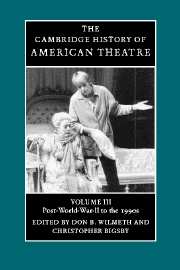Book contents
- Frontmatter
- Introduction
- Timeline: Post-World War II to 1998
- 1 American Theatre in Context: 1945–Present
- 2 A Changing Theatre: Broadway to the Regions
- 3 The Plays and Playwrights
- 4 Musical Theatre since World War II
- 5 Directors and Direction
- 6 Actors and Acting
- 7 American Theatre Design Since 1945
- Bibliography
- Index
1 - American Theatre in Context: 1945–Present
Published online by Cambridge University Press: 28 March 2008
- Frontmatter
- Introduction
- Timeline: Post-World War II to 1998
- 1 American Theatre in Context: 1945–Present
- 2 A Changing Theatre: Broadway to the Regions
- 3 The Plays and Playwrights
- 4 Musical Theatre since World War II
- 5 Directors and Direction
- 6 Actors and Acting
- 7 American Theatre Design Since 1945
- Bibliography
- Index
Summary
Introduction
The history of the United States, more than that of most nations, has been depicted as a grand and heroic narrative – a great epic of the triumph of the human spirit over adversity, the victory of good over evil, and the success of the individual in the face of enormous odds. From colonial times well into the twentieth century, the theatre was not only a reflection of this mythology, it was a crucial instrument for the molding of public perceptions. Prior to the birth of the movies – which did not really become a mass medium until the 1910s – theatre, especially in its popular incarnations, such as circus, vaudeville, and minstrel shows, was the closest thing to a national forum that the country had. Ideas were debated, public opinion was formulated, and national consciousness was achieved on the stages of American playhouses. In this context, the melodrama – the dominant form of the nineteenth century – was something close to American classicism. It created such quintessential figures as Mose the Bowery B’hoy, Nimrod Wildfire, Jonathan, and their kin – all symbols of the young, energetic, and fundamentally good American society, and all players in the grand story. As long as the American narrative was unfolding, the popular drama was a critical tool for the dissemination of ideas and the creation of a national sense of unity and purpose. But World War I began to reshape American consciousness as the country was no longer one player among many on the world stage but a protagonist; World War II continued the transformation of global politics and economics while permanently altering America’s international position and fundamentally transforming American life and sensibility.
- Type
- Chapter
- Information
- The Cambridge History of American Theatre , pp. 87 - 162Publisher: Cambridge University PressPrint publication year: 2000
- 1
- Cited by



